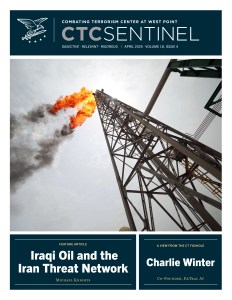From the Editor
In this month’s feature article, Michael Knights illuminates the nexus between Iraq’s oil sector and the Iran threat network. He writes: “The Iran threat network suffered grievous blows in Lebanon, Syria, Gaza, and Iran itself in 2024, and this has arguably made oil-rich Iraq even more important to the network. Facing renewed maximum pressure from the United States, Iran needs not only Iraq’s terrorist fundraising potential but also its value as a ‘laundromat’ through which Iranian energy products can be fraudulently relabeled as Iraqi exports. Using their control of the al-Sudani government, Iran-backed terrorist groups and militias are developing significant new strands of threat financing using Iraq’s oil sector, which combine to provide billions of dollars of illicit value each year. Iraq is thus emerging as Iran’s best bet for neutering the Trump administration’s renewed maximum pressure campaign.” He notes that “U.S.-designated foreign terrorist organizations are no longer content to steal oil, only to have smuggling businessmen realize most of the profits. Instead, terrorist organizations have muscled into this value-addition segment of the oil market in recent years, with AAH [Asaib Ahl al-Haq] and KH [Kataib Hezbollah] leading the pack.”
Our interview is with Charlie Winter, the co-founder and chief research officer of ExTrac AI, an AI-assisted intelligence platform that identifies, maps, and forecasts geopolitical risk, including in the counterterrorism space. He states: “Our USP pivots around accessing, ingesting, and processing high-relevance publicly available information and data from hard-to-reach parts of the internet that reflects the online and offline activities and psychological operations of various non-state and state threat actors. And through our platform, which is both a web and mobile app, we provide both access to that data and the ability to generate insight from it rapidly—and we do that using a range of different kinds of automation, machine learning, [and] artificial intelligence.” He adds: “We essentially have built our system to let machines do what they do best and let human analysts do what they do best, and enable the analysts to spend a lot more time performing the highest-value tasks in the intelligence cycle.”
Ayush Verma, Imtiaz Baloch, and Riccardo Valle examine the Baloch insurgency in Pakistan. They write: “The Baloch insurgency in Pakistan has intensified sharply since the beginning of 2025, marked by sophisticated attacks such as the Jaffar Express hijacking by Baloch Liberation Army-Jeeyand faction (BLA-J) on March 11, 2025, which resulted in the kidnapping of more than 400 passengers and death of at least 26 hostages. Groups like BLA-J, Balochistan Liberation Front (BLF), and Baloch Liberation Army-Azad faction (BLA-A) continue to deploy suicide bombers, including women, and temporarily seize territories, targeting Chinese nationals and China-Pakistan Economic Corridor (CPEC) projects. The insurgency’s regional spillover, especially into Iran, and competition for resources and prominence among factions of the insurgency further complicate Pakistan’s internal security.” They add: “Without a political resolution addressing long-standing grievances, the insurgency threatens to escalate, destabilizing both national and regional security.”
Paul Cruickshank, Editor-in-Chief
 Skip to content
Skip to content

